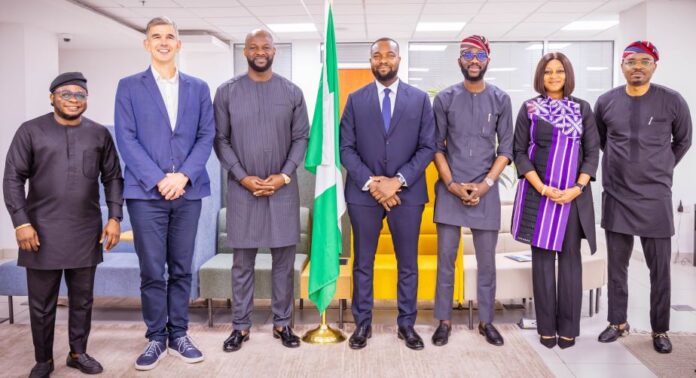By Eberechi Obinagwam
The Federal Ministry of Communications, Innovation & Digital Economy (FMCIDE) has announced a new support from Google to accelerate AI talent development across Nigeria.
Announcing the support on Thursday, the Ministry said, this support, which is provided through a N2.8billion grant from Google.org to Data Science Nigeria, will bolster the Ministry’s ongoing AI-driven initiatives to upskill youth and under- and unemployed Nigerians, with a focus on AI skill development and education, adding that, it is the grant is part of Google.org’s broader $5.8million commitment to support digital skills programs across Sub-Saharan Africa.
Dr. ‘Bosun Tijani, Honourable Minister of Communications, Innovation & Digital Economy, emphasised the importance of this support in driving Nigeria’s digital transformation: “This support from Google is a testament to our commitment to positioning Nigeria as a leader in AI innovation. By leveraging Google’s expertise and resources, we are creating opportunities to equip Nigerians with the skills they need to thrive in the global digital economy. This is a major step forward in our journey towards a more inclusive and innovative future for all Nigerians.”
The N2.8billion Google.org grant will support Data Science Nigeria’s work with the Federal Ministry’s AI talent development programs, including:
DeepTech Ready Upskilling Programme: To provide 20,000 young Nigerians with advanced technical skills in data science and AI, preparing them for careers in this rapidly growing field.
Experience AI Programme: To equip 25,000 educators with the tools and resources to teach 125,000 young people about AI, inspiring the next generation of AI innovators.
Government AI Campus Programme: To upskill policymakers and public servants in AI policymaking, ensuring that Nigeria’s AI policies are developed and implemented responsibly.
Earlier this year, the Ministry set the stage for AI integration in Nigeria by hosting the National Artificial Intelligence Strategy (NAIS) Workshop, followed by the release of the National AI Intelligence Strategy. This strategy aims to leverage AI to drive economic growth, improve governance, and enhance the well-being of all Nigerians. This new support from Google.org will build on this strong foundation, further cementing Nigeria’s position as a leader in AI innovation on the continent.
In a significant step toward advancing the AI ecosystem, the Ministry and Google also announced the selected beneficiaries of the AI Fund, established by the National Centre for Artificial Intelligence and Robotics (NCAIR) in collaboration with Google. The Fund will see each selected startup receive ₦100million in funding, along with up to $3.5million in Google Cloud Credits to help scale their solutions. Additionally, these startups will gain access to Google’s world-class AI tools, mentorship from Google’s AI experts, and opportunities to connect with a global network of innovators and partners.
The 10 startups selected for the AI Fund are:
BetaLife Health: Leverages AI to predict demand and match blood types for Africa’s blood supply needs.
Bunce: AI-driven platform that centralises and personalizes customer engagement for businesses
CDIAL AI: Enables seamless text-to-speech and speech-to-text AI functionality in 13 languages across underserved regions.
Farmspeak: Leverages AI to support livestock farmers with disease detection and climate control.
Lendsqr: Streamlines lending operations using AI, empowering global lenders and borrowers.
ProDevs: Connects global companies with vetted African tech talent through AI-driven pre-classification and job matching.
Rana Energy: AI-powered energy management optimising sustainable power for underserved users.
SaaSPro Health: AI-driven healthcare documentation with tailored tools for Nigerian doctors.
Towntalk: Leverages AI to provide contextual security insights for African communities, empowering informed decision making.
Trade Lenda: Streamlines credit analysis for MSMEs using AI, facilitating access to financing.
By focusing on sectors such as healthcare, agriculture, education, and governance, the startups will play a crucial role in addressing local challenges and driving sustainable economic growth through AI.
Matt Brittin, President of Google for Europe, the Middle East, and Africa, shared Google’s commitment to Africa’s innovation ecosystem: “Across Africa, entrepreneurs are harnessing the power of technology, including AI, to address large-scale societal challenges. Google remains committed to supporting these innovators, helping them expand their impact across the continent and beyond. Our work in Africa has always been about unlocking the digital economy’s benefits for more people, and this collaboration continues that mission.”
This initiative aligns with a broader report highlighting the economic potential of AI in Nigeria. According to recent findings from Public First, Artificial Intelligence could add as much as $15billion to Nigeria’s economy by 2030. By equipping local entrepreneurs and innovators with the tools, resources, and training needed to leverage AI, this initiative seeks to harness that potential, further reinforcing why this collaboration is vital for Nigeria’s digital future.
It builds on Google’s N1.2billion commitment to Nigeria, announced in 2023, aimed at empowering 20,000 Nigerians through digital skills and economic growth programs.
Through this support, the Ministry, alongside Google, aims to build a sustainable AI ecosystem that will not only foster innovation but also drive economic and social impact across Nigeria.













